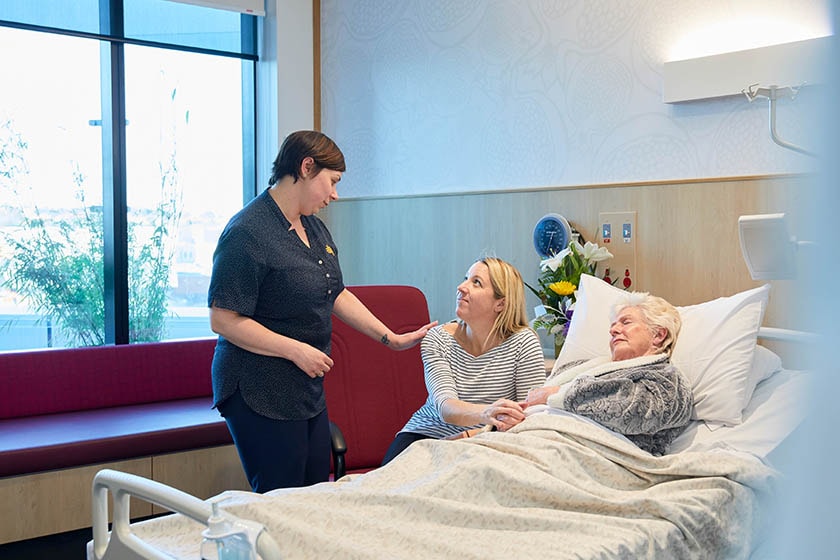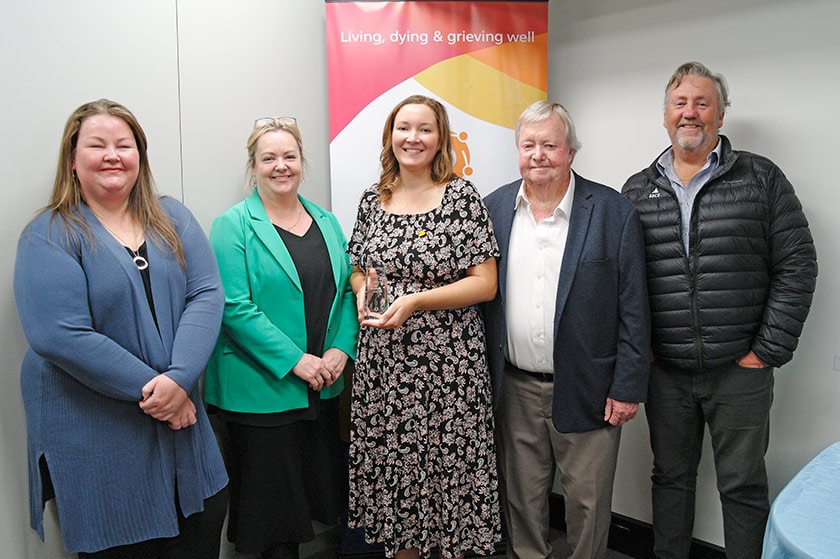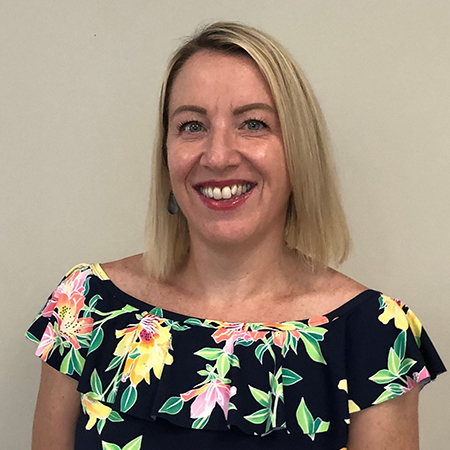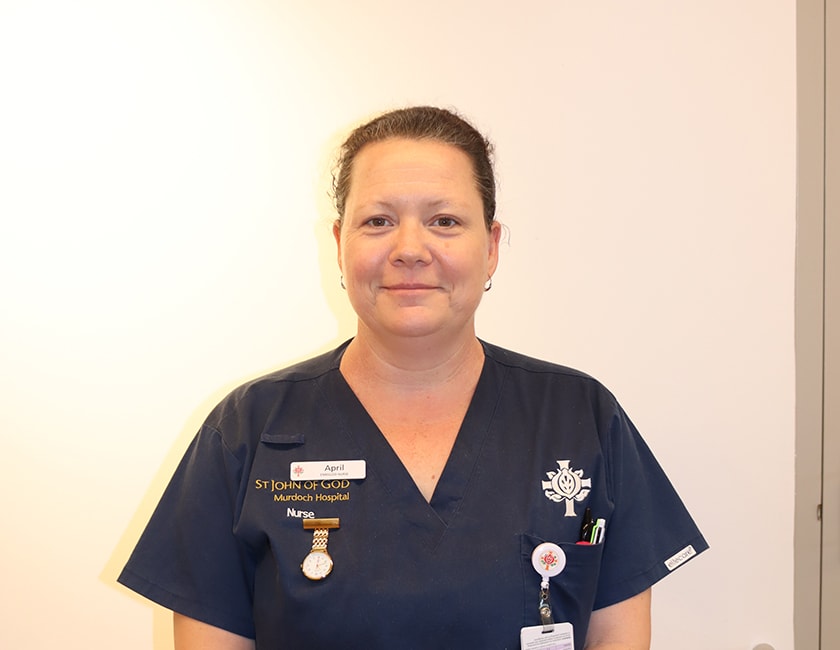St John of God South East Melbourne Hospitals Cancer Care Coordinator Jo Wilson prefers not to use the word terminal for patients in palliative care unless they are imminently dying.
Instead, she believes that although palliative care is for people who have an incurable illness, practitioners such as herself are there to support patients and their families in all aspects of living with an illness.
“A life-limiting prognosis doesn’t always mean death is near,” she said, “even incurable conditions can be managed long-term.”
Relief of symptoms is one of the main aims of palliative care. It manages the physical, emotional, spiritual and social impacts of an illness without actually trying to cure it. Treatment is always tailored to an individual’s needs and provides much needed support to families and carers. As Palliative Care Nurse Robin Cooksey described it, “palliative care is simply about your choices, your decisions, your voice.”
It is the work of palliative care practitioners to give people the chance to live as well as possible, for as long as possible, with their support extending far beyond just providing care at the end of a person’s life. For St John of God Health Care workers, they not only attend to the medical needs of patients with incurable illnesses, they have a dedicated palliative care unit, that works alongside its pastoral care practitioners to identify and treat a person’s symptoms whether they be physical, emotional, spiritual or social.
St John of God Berwick Hospital Nurse Unit Manager Mandy Fidanza, whose unit provides palliative care, said it's a privilege to connect and care for someone and their family.
“Being involved in each patient’s unique story - even if their life ends with us - we forever become a part of their ongoing story and that of their family’s," Mandy said.
"Patients can often come to us at their most vulnerable time and yet they let us into their lives. It’s our job to guide them, assist in their decision-making and help them achieve their goals and wishes, taking into account their cultural and religious needs, disability and age – it all influences and shapes the care you give them.
"Most importantly, ensuring that when they are at the end of their journey, they are where they want to be-either at home or in hospital, surrounded by the people they want to be with.”
While Mandy admitted the job of a palliative care worker can be difficult at times, it doesn’t detract from the hugely rewarding experiences they gain along the way.
“We learn to be patient, calm, non-judgemental and understanding. We have broad shoulders and yet we cry. We’re human. We get attached. We share experiences with our patients and their families … and sometimes things really touch a chord,” Mandy said.
But other times, palliative care workers share in the joy that the perplexity of life can bring – often having the opportunity to be truly impactful in the last moments of a person’s life.
Mandy reflected on one such experience where a patient she was caring for received a very limited prognosis with only days left to live. It was, however, his greatest wish to get home with enough time to teach his grandson how to change the oil in his car. Although it was a Friday and a discharge process can take days to coordinate, Mandy and her team, with the help of community palliative care, were able to ensure the stars aligned enough to allow her patient to be discharged the following morning with adequate pain management in place.
A few weeks later Mandy would learn that her patient fulfilled many of his final wishes, most importantly, teaching his grandson to change the oil. And after spending the limited time he had left with his family over that weekend, he passed away peacefully on the Monday morning - his family forever grateful for the time they got to share with him.
While the care of patients is at the forefront of a palliative care worker’s role, the care of their family members becomes ever more central to the holistic care of the dying person also.
As Mandy explained, when a patient feels comfortable and their needs are being met, families can feel more at ease with their loved one’s passing.
"We only have one chance to get it right and if we miss opportunities it can lead to complicated grief for families left behind,” Mandy said.
“That’s why it’s the little things that matter. Sitting with a patient for a period of time. Talking about who they are, what hopes they have for their family, what their fears are - ensuring that we know where they want to be and who they want to be with at the end of their journey is paramount.
"It’s very important to us, that a patient knows they have control over what happens to them and that they have been granted their wishes at every possible opportunity.”
Acting Director of Clinical Services Karen Ward who recently spearheaded the introduction of palliative care at our St John of God Frankston Rehabilitation Hospital, agrees.
“It’s been an honour to be able to bring this service to the Mornington Peninsula. With a lack of palliative care in the area it means that a lot of people face dying in a clinical setting that isn’t equipped to provide the comfort and care that we can offer to our patients and their families throughout their final days.”
Being able to access care close to home means that our patients can remain in a familiar environment and be visited by loved ones, pets, neighbours and friends in their local community much more easily.
“Our patient lounge, sensory garden, pastoral care practitioners and art and music therapies are all designed and accessible specifically with the needs of palliative patients in mind. The peace that comes with knowing you and your family will be well cared for helps our patients die well and their families grieve well,” said Karen. “It’s this sort of comfort that is invaluable to patients in their final stages of life and it’s a service that I’m very proud that we can now offer to our local communities.”
If you’d like to learn more about our palliative care services you can contact:
St John of God Berwick Hospital
Phone 03 8784 5000 or email Berwick
St John of God Frankston Rehabilitation Hospital
Phone 03 9788 3333 or email Frankston







